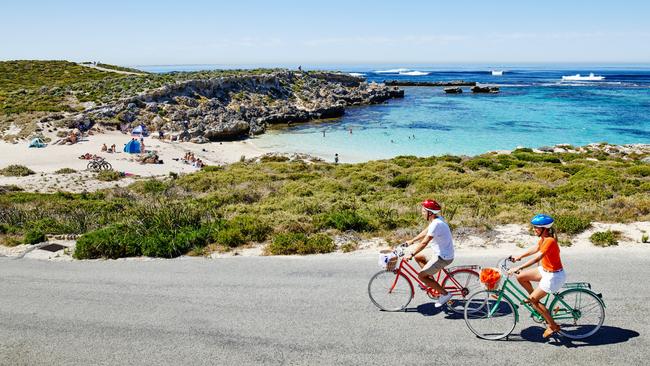Budget 2020: Boost for domestic travel campaign
Australians will be encouraged to holiday at home and develop COVID-safe Australia Day events under a range of budget measures.

Holidaying locally, upgrading World Heritage sites, and developing COVID-safe Australia Day events have topped the government’s priority list for reinvigorating the tourism industry.
Tourism Australia will get $232m to ramp up marketing activities encouraging us to travel again within our own country, and $33m will be shared among the states to improve infrastructure at famous world and national heritage sites “to ensure greater conservation outcomes and improved visitor experiences”.
Another $15.5m will support events that focus on pandemic recovery and delivery of COVID-safe Australia Day 2021 events.
The government has also extended funds for its national tourism icons package, with another $5.9m for Rottnest Island in Western Australia, $2.9m for Freycinet National Park in Tasmania and $1m for Queensland’s Wangetti Trail.
The funds are in addition to a $50m regional tourism recovery initiative previously announced and $50m worth of grants designed to get business events up and running again.
There were few new initiatives for the aviation industry, in a blow to struggling flight training schools, airports and aircraft maintenance firms hoping for a lifeline. Flying the nation’s produce to the rest of the world scored the lion’s share of $356m worth of “additional aviation support”, in recognition of the need to keep two-way supply chains operating.
A sum of $317.1m will pay for the international freight assistance mechanism to be extended to June 30, which will benefit foreign and local airlines as well as exporters who rely on space in the belly of commercial aircraft.
“With international travel restrictions expected to remain in place for the foreseeable future, our exporters and key importers will continue to face significant barriers,” the budget papers note.
“This initiative will continue to keep Australian farmers in business by ensuring they can get their high-quality produce into key export markets and that they stay connected with their overseas customers, and ensure access to vital imports including medical supplies.”
The rest of the additional aviation support would be shared among government agencies, including the Australian Transport Safety Bureau and Civil Aviation Safety Authority, “to continue to regulate Australia’s air safety”.
The Gold Coast Airport was promised funds to support the relocation of border services to its revamped international terminal, but chief operating officer Marion Charlton was hoping to see more in the way of assistance.
“Airports were the first to be hit and the hardest to be hit, and the Gold Coast was particularly badly affected (by COVID-related travel restrictions),” Ms Charlton said. “At least with personal income tax cuts and a domestic tourism marketing campaign, people should have the confidence to travel again, and the Gold Coast should benefit from that.”
The government has already stumped up $2.7bn in support for the aviation industry, in the form of regional airlines assistance, repatriation flights, fee relief and an exemption from land tax for federally-leased airports.




To join the conversation, please log in. Don't have an account? Register
Join the conversation, you are commenting as Logout